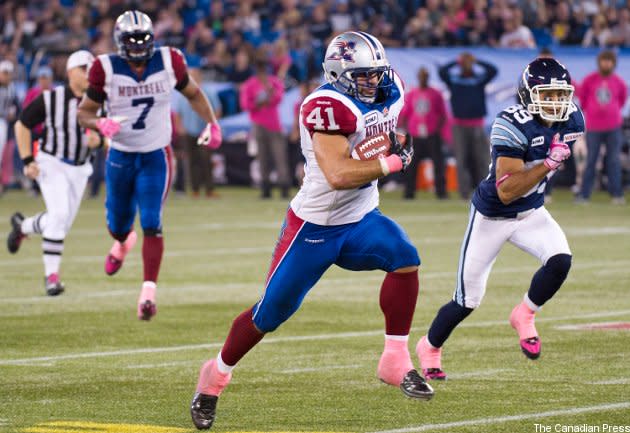Depression and mental health in the CFL: can Shea Emry’s openness make a difference?
Mental health has been a prominent subject of discussion this week, with Bell's Let's Talk campaign raising over $4.8 million for Canadian mental health programs thanks to tweets, texts and calls Tuesday, and it's a discussion that needs to be had in the CFL as well. The life of a pro athlete may seem glamourous to some, but mental health issues and depression in particular can strike those from any walk of life. It's not easy for many to be open about it, though, so athletes like former Canadian Olympian Clara Hughes (who has prominently discussed her own struggles with depression and played a key role in the Let's Talk initiative) coming forward can play a crucial role in raising awareness of mental health issues. We've seen that in the CFL too, where perhaps the key case in point comes from Montreal Alouettes' linebacker Shea Emry. As Herb Zurkowsky wrote last November, Emry decided to take his story public to show how depression can hit even those who seemingly have it all together:
“I was bullied as a child. I had thoughts that maybe I wasn’t good enough. I wanted to be accepted, and I wasn’t,” Emry continued. “Bullying led to where I was and where I’ll continue to be. Depression doesn’t go away. It has been in my life twice. Sooner or later, it’ll probably come back, and I’ll have to make choices and decisions to get out of it.
...Emry is doing everything he can, not keeping things inside any longer, conducting open conversations with family and friends. He’s surrounded by people who love him and care, but Emry knows the battle isn’t over. The demons could materialize again, when least expected, and he won’t simply be able to apply a Band-Aid until the wound heals.
“This can affect anyone,” he said. “Someone can appear to be in a sunny place when there’s a shadowy cloud over the top of their head. It can affect anyone.”
One especially notable section of that Emry piece focuses on how his depression returned in a particularly nasty form in 2011 following a concussion he suffered. That led to him abusing drugs and alcohol, and that's a story we've seen plenty of times before; in fact, a January study of 34 former NFL players found that "former players who are depressed or cognitively impaired typically have noticeable abnormalities in a specific component of their brain known as the white matter, which is the cumulative mass of insulated nerve fibers that connect one neuron to another"; a related study set to be presented in March found "players who reported a higher number of career concussions also tended to exhibit more depressive symptoms".
Depression has been reported to be a factor in the suicides of former players like Junior Seau and Dave Duerson, and both were later found to have chronic traumatic encephalopathy (CTE), the concussion-linked degenerative brain disease that has been found in many former NFL and CFL players. There's still a lot we don't know about concussions and how they affect the brain (although promising strides are being made), but the links between concussions and depression that have come out thus far are frightening. Not all depression is concussion-related, but the potential of concussions to cause or worsen depression and the propensity of football players to suffer concussions means that depression and other mental illnesses need to be prominent subjects of discussion in the CFL. Players need to know that hits to the head may affect their emotions and their mood, and coaches and teammates need to be there to help them through depression if it does arise.
Depression shouldn't be a taboo subject in society as a whole, but we should particularly be open to talking about it in football given the links to concussions. Battling depression doesn't make you less of an athlete or less of a man, and it shouldn't be ignored in favour of the old tough-as-nails credo of football players. Emry's courageous decision to step forward last fall and share his story shows that depression can strike anyone. Now, the rest of the CFL needs to take a cue both from him and from the growing societal openness to discussing mental health issues, as shown through efforts like the Let's Talk campaign. Players should be encouraged to share their struggles, either privately with teammates and coaches or publicly, and the league and its teams should consider getting involved in further mental health initiatives. Mental health issues can affect us all, including pro athletes; the CFL needs to have plans in place to encourage athletes to come forward with their struggles and to help them once they do.

 Yahoo Sports
Yahoo Sports 


